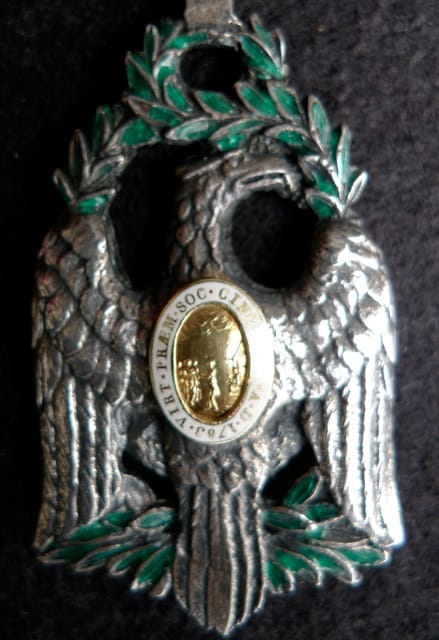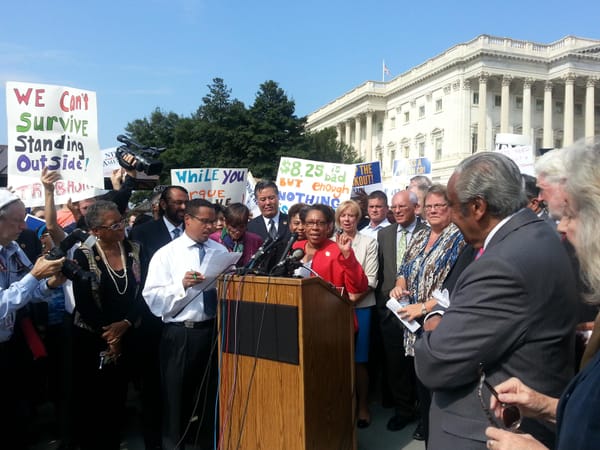Does Military Service Qualify One as a Legislator?

Military veterans have always been a major part of the American political landscape, since the first commander of the Continental Army was unanimously chosen as the first president of the unified republic. And in that time, the question of what level of deference to this class of veterans has been active - with Washington and Hamilton clashing with the likes of Benjamin Franklin over Washington’s creation of an ‘Order of Cincinnati’ to honor his comrades in the war and their descendants. Since that point, Americans have generally preferred to elect veterans - from militiamen to generals - to the nation’s highest office, and many below it.
However, after the defeats of Al Gore , John Kerry, and John McCain, and with either aged draft avoider Donald Trump or the too young to have served Kamala Harris becoming the next president, it seems all but certain that the office of the presidency will never be held by a combat veteran of the Vietnam War, the last major conflict in which the US deployed conscripted servicemen. Many have written about what this says about how Americans viewed, and view, the war. However, starting in 2001, a new global conflict has given rise to a new generation of veterans, both combat and otherwise – the Global War on Terror. Many millions of Americans served in the military during that time and between two and three million were deployed to Afghanistan or Iraq between 2001 and the withdrawal in 2021. Of these, many of the earlier generation have pursued careers in politics. Both vice presidential candidates were deployed overseas during this conflict – JD Vance to Iraq as an active duty press officer, and Tim Walz to Germany as a National Guard artilleryman – and numerous others, like Tom Cotton, Dan Crenshaw, and Tammy Duckworth, serving in congress. For a few, military service has been the centerpiece of their campaigns. Nowhere has this been more true than Montana, where both sitting congressman Ryan Zinke and Senate candidate Tim Sheehy have made their service in the Navy SEALs key parts of their pitches to Montana voters, with Sheehy’s website prioritizing pictures of himself in combat gear and his campaign signs touting his status as an ‘American Warrior’. In a couple weeks Montana voters will decide if these men are well suited to serve as legislators, and over the next decade voters across the country will likely need to do the same – which leads inevitably to the question of whether, in their specific case or in general, military service is a recommendation for legislative responsibility.
The first question is what virtues military service reveals about one’s character. According to English writer Samuel Johnson, “Every man thinks meanly of himself for not having been a soldier”, and there does seem to be a sort of natural deference civilians pay to those who put their lives on the line in the service of their country. Certainly, in many scenarios this is owed – after all, few civilians can really understand the sacrifices that are part of serving in the armed forces, and most would agree that at least on some scale -though not, perhaps, the present one - those sacrifices need to be made by someone. Of all the virtues to be displayed, physical bravery is certainly one that cannot be doubted in combat veterans. But, as Frederick Douglass noted in his Decoration Day speech of 1871, “The essence and significance of our devotions here to-day are not to be found in the fact that the men whose remains fill these graves were brave in battle…we are not here to applaud manly courage, save as it has been displayed in a noble cause.” Bravery can be found for causes noble and infamous – and anywhere in between. Fighting for American interests in Afghanistan is certainly not akin to the dishonor of having fought against the United States in the Civil War – at the same time, it is a valid question whether having fought in a war of a choice that is now roundly regretted is or should be seen the same way as having fought to preserve the union or to stop fascism. Zinke and Sheehy are patriotic, in one sense – they were willing to give everything for the country they were born in. From a liberal perspective, however, this loyalty to the government of the United States is only one of many virtues, and perhaps not the highest. And given the many needs of a society, it is likely true that, as Cicero says, “There are, therefore, instances of civic courage that are not inferior to the courage of the soldier. Nay, the former calls for even greater energy and greater devotion than the latter”. For demonstrating the values of courage and patriotism, Zinke, Sheehy, and others certainly deserve praise – but it is not at all clear that one should ‘think meanly’ of those who contributed to the good of their country in other ways. Indeed, given the peculiar complexities of the War on Terror, those who stayed home to raise crops, teach children, or practice law, as Sheehy and Zinke’s opponents did, may have contributed in a much more direct and straightforward, if less dramatic, way.
The values of bravery and patriotism are also not the only ones we need. Honestly and transparency would be another two arguably more needed in a democracy. Both Zinke and Sheehy seem to have different understandings of these virtues. Zinke, for example, previously served Donald Trump as Secretary of the Interior. In that capacity he was found to have misused his authority relating to a development project in Whitefish, Montana, his hometown. Zinke also attempted to put a Whitefish firm, with only two employees, in charge of a $300 million contract to rebuild the Puerto Rican power grid after Hurricane Maria. However honorable Zinke’s military service, his life since then indicates that these are not virtues he has kept with him.
Tim Sheehy has not yet entered politics, but questions about his own honesty are, while more minor, perhaps actually more troubling. In 2015, Tim Sheehy ended up in the hospital with a bullet in his arm. At the time, he told hospital staff that a firearm he was carrying had negligently discharged, and accepted a citation on that charge. Subsequently, though, Sheehy has claimed this story was a lie, and the bullet was in fact a combat wound, which he covered up to ‘protect fellow servicemembers’. Assuming his current version of the story is correct, Sheehy (at this point in the Naval reserve) lied to a federal law enforcement officer in order to subvert the disciplinary processes of the military justice system. In doing so, he may well have demonstrated an admirable personal trait, especially in a military context – unfailing loyalty to his own comrades. However, in a legislative role, it is important to be honest – especially to law enforcement – over and above personal loyalties, even to the military. To do otherwise – to prefer one’s military comrades to those to whom one has a civilian responsibility - is to choose a course that has, time and time again, subverted civilian representative government.
Sheehy and Zinke certainly do not rule out the possibility that the military demonstrates important virtues – indeed, no one should doubt their bravery, nor assume that other veterans share their aversion to transparency. But they certain demonstrate that these virtues are not necessarily universal ones of veterans. Beyond demonstrating virtues, there is also the question of the skills or beliefs military service instills in veterans. For those who undergo extremely intensive training and serve repeatedly in combat, like both Sheehy and Zinke, these are undoubtedly life changing experiences that impact both the values and experiences they bring to subsequent work. Many veterans credit the leadership, decision making, and confidence of military service to helping them succeed in business. The same is quite possibly true in the process of politics – after all, both a military conflict and election are decided on the basis of ‘campaigns’. But are these skills inherently likely to produce good legislators?
The basic structure of the military may suggest otherwise. By necessity, military forces are hierarchical, with clear chains of command and no question of who holds rank over whom. Cooperation and teamwork are paramount, but so is the willingness to quickly carry out commands. Having both worked their way into leadership positions in the SEALs, Zinke and Sheehy no doubt have experience in taking initiative and giving orders. The challenge is that legislation is not, or should not, be like this. The set up of a legislative body, and indeed of the government generally, is designed almost opposite of a military. The author of Federalist 51 declared that in the US constitution, the “aim is to divide and arrange the several offices in such a manner as that each may be a check on the other”. In a military unit, such constant checking would be disastrous. In our legislative system, we hope it is an effective defense of liberty. Sheehy and Zinke’s backgrounds are unlikely to give them much in the way of either useful beliefs or skill sets in negotiating the much more complicated world of legislation, where rank is unclear and clear orders can rarely be given to one’s fellow legislators. An “American Warrior”, as Sheehy’s campaign signs describe him, may have many skills and a mindset valuable for many things – but legislation is unlikely to be one of them.
This again does not mean that no combat veterans or commanders can be effective legislators – indeed, many of the great names in 20th century politics served as military commanders of units of varying sizes, from a torpedo boat (Kennedy) to millions of men (Eisenhower). But much as a CEO like Donald Trump may find it difficult to adapt from being an unquestioned boss to being part of a complex system of checks and balances, commanding a SEAL unit is a far different task than shepherding a bill through congress and requires dramatically different skills and attitude. Indeed it’s entirely possible Zinke’s ethics scandals stemmed ultimately from an unwillingness to accept the difference in how civilian versus military authority operates.
For as long as the US maintains an active military, military veterans will be an active part of our politics – and one hopes that their patriotism and courage continue to be admired even in the face of partisan differences. However, there is literal reason to assume that veterans, however decorated, of the Global War on Terror will be inherently more successful, fair, or effective legislators and politicians than their counterparts who pursued civilian careers. There are many virtues and skills associated with military service, but none of them are guaranteed to translate into legislative service, and indeed almost certainly need to be complemented with others, like transparency and negotiation – that are best learned in other contexts.



